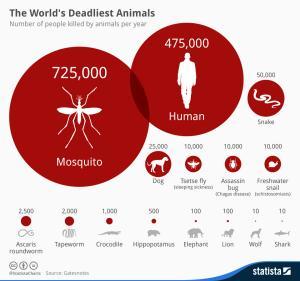 I had an interesting exchange on Twitter today that deserves some discussion, not because the brief internet argument that ensued offers some insightful wisdom (internet debates rarely do anything more than identify all those involved as fuckwits), but because it raises an interesting issue in conservation.
I had an interesting exchange on Twitter today that deserves some discussion, not because the brief internet argument that ensued offers some insightful wisdom (internet debates rarely do anything more than identify all those involved as fuckwits), but because it raises an interesting issue in conservation.
The abbreviated (and slightly expurgated) main message of the exchange was whether drawing attention to the potential for a species to cause harm to humans is good or bad (for the species in question).
The elasmobranchologists in particular usually become apoplectic whenever anyone calls a shark ‘deadly’, or some such similar adjective. As it turns out, the ophidiologists appear to be equally sensitive. I admit that they do have a point — it’s probably fair to assume that films like Jaws and Anaconda (or, Darwin-forbid, Sharknado) haven’t done much to make most people appreciate the amazing diversity, evolutionary adaptations and wonderful life histories of these subclasses & clades (respectively).
In fact, most marine biologists assume that Jaws in particular was responsible for decades of overt prosecution of sharks that has led to the massive population declines. However, I sincerely wonder whether the bad media was in the real culprit and over-fishing was instead the principal cause of today’s observed shark declines (the questionable nature of the numbers often cited notwithstanding).
So I’ll finally get to my point — which turns out to be more of a question — do negative (fear-based) media campaigns do more harm than good when it comes to deadly (i.e., able to cause death) species? Does highlighting in some sensationalised television series or movie the fact that a white pointer can easily chomp you in half, or that a baby brown snake can off your three-year old in under two hours, lead to a worse conservation status for the taxa concerned? Does fear-based media coverage have no real conservation affect at all, or does it potentially lead to better conservation outcomes because of the public’s morbid fascination with the species involved?

Fear doesn’t flow from the cerebral cortex; it has bugger all to do with empirical data. Yet people are fascinated by it. Why do millions of kids the world over go ga-ga when they read a shark story? Why are we fascinated with the things that could (but rarely do) kill us? My question can therefore be developed into an hypothesis that someone out there should endeavour to test: do modern-day, fear- (morbid fascination- ) based media exposées really do species harm, or is it much worse for a relatively benign species of which no one has heard a thing? To deform completely an old quote from Oscar Wilde, is the mere fact that people are interested in a topic (whatever their reasons) enough to shine a light on a species’ conservation plight, or does it always have to be sugar-coated message of positivity? Is there empirical evidence out there that cheesey, over-the-top, sensationalised television leads to population declines? I’d really like to know.
Granted, I bet the data will be hard to come by, but if there is anything out there at all of an empirical (cf. philosophical) nature, I’d be interested in hearing about it.

